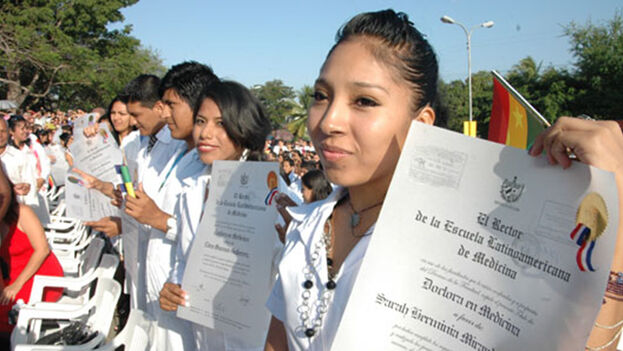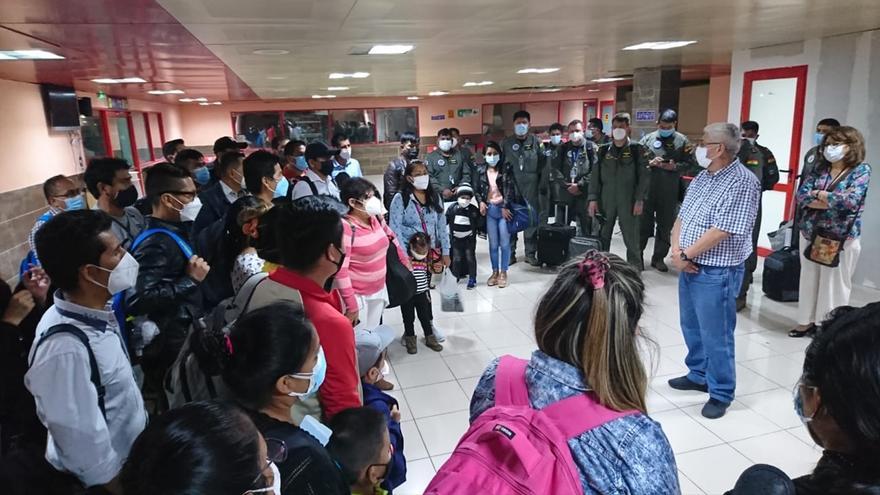
![]() 14ymedio, Havana, 18 October 2022 — The 5,000 medical scholarships that Cuba touted in 2015 as a donation to Bolivia, cost Evo Morales’s government millions of dollars. The Island charged “registration for each student, annual tuition, room and board, transportation, health insurance and even for the students’ clothes,” a report from El Deber uncovered.
14ymedio, Havana, 18 October 2022 — The 5,000 medical scholarships that Cuba touted in 2015 as a donation to Bolivia, cost Evo Morales’s government millions of dollars. The Island charged “registration for each student, annual tuition, room and board, transportation, health insurance and even for the students’ clothes,” a report from El Deber uncovered.
Annex IV of the confidential report, accessed by the Bolivian media outlet, indicates that the Island received $1.5 million as payment for the students’ room and board, as well as $17,000 dollars per person for tuition and another $1,000 for registration.
The information, which was corroborated by the Foundation for Human Rights in Cuba, confirms that Morales’s government signed aggreements, but “not for donations received nor to benefit from the implementation of programs, but rather to provide economic assistance” to the Island.
The awarding of 5,000 scholarships was part of the 11 points signed by leaders Evo Morales and Fidel Castro on December 30, 2005.
A decade later, on September 6, 2015, Cuba’s ambassador to Bolivia at the time, Benigno Pérez Fernández, representing Minister of Public Health Roberto Moralez Ojeda, and former Bolivian Minister of Health, Ariana Campero Nava, classified the agreement as “confidential.”
Bolivia and Cuba committed to “not divulge, share or make public any information exchanged between them or to which they had access during the implementation of the agreement, so long as the information was not already in the public domain, required by law or through mutual agreements between them.”
The program came to light in 2012. The Executive Committee of Universidad Boliviana denounced that a portion of the group who received scholarships and “graduated” on the Island, which did not exceed 1,600 “did not even complete 70% of the core subjects required in the Bolivian academic system,” published Radio y Televisión Martí.
Universidad Boliviana confirmed that the graduates on the Island not only did not comply with the “minimum requirements to practice their profession” but also, despite that, the government of Evo Morales hired some of them.
The Bolivian Minister of Health at the time, Juan Carlos Calvimontes, argued that the posts filled by the health workers trained in Cuba were those that Bolivian doctors did not want to cover.
Calvimontes confirmed that of the 5,000 alumni who received scholarships since 2006, most spent six and a half years studying. Others, without saying how many, stayed an extra year of obligatory social service on the Island and six more months in Bolivia.

The controversy has followed Bolivia’s relationship with Cuba. In January 2020, Bolivia’s attorney general arrested and accused Carlos de la Rocha, — who was acting national coordinator of the government’s health program under former president Evo Morales — of corruption for alleged anti-economic behavior, not fulfilling his duties, and aggravated robbery.
After the scandal, the Colegio Médico de Bolivia [Bolivian Medical School] requested an investigation into the funds earmarked by Morales’s government for contracting doctors from the Island. “We are discovering that state funds were squandered, deposited in individual bank accounts, supposedly, to pay Cubans when these resources should have been in a government account,” said the president of the Colegio Médico de La Paz [Medical School in La Paz], Luis Larrea.
After Evo Morales left power, Cuba withdrew more than 700 “cooperators” it had in that country. After their exit, data began to emerge: only 205 of the 702 Cubans that were on the medical mission in Bolivia had medical degrees, according to revelations by the Minister of Health of the Andean country, Aníbal Cruz. Most were technicians or drivers.
Translated by: Silvia Suárez
____________
COLLABORATE WITH OUR WORK: The 14ymedio team is committed to practicing serious journalism that reflects Cuba’s reality in all its depth. Thank you for joining us on this long journey. We invite you to continue supporting us by becoming a member of 14ymedio now. Together we can continue transforming journalism in Cuba.
